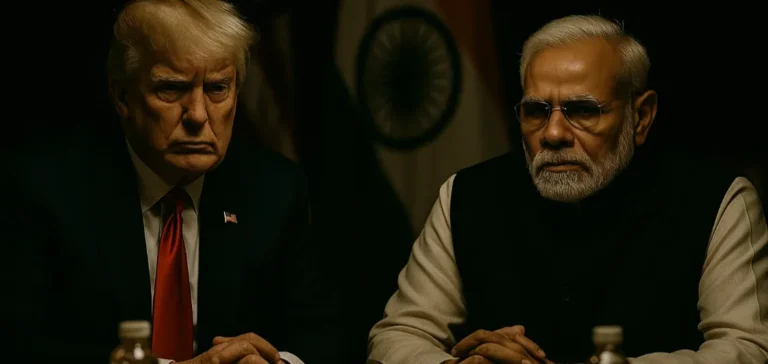India has firmly rejected Donald Trump’s threats to impose “substantially” higher tariffs on Indian exports to the United States. The American president justified this measure by New Delhi’s “massive” purchases of Russian oil, stating on Truth Social that India “doesn’t care how many people are being killed in Ukraine by the Russian war machine.” The Indian Ministry of External Affairs called these criticisms “unjustified and unreasonable” on Monday, promising to take all necessary measures to protect the country’s national interests.
Tensions have intensified as Trump has set an August 8 deadline for Russia to reach a peace agreement with Ukraine, threatening to impose secondary sanctions on Russian oil buyers if no agreement is reached. India ranks among the top three Russian crude importers, receiving 1.6 million barrels per day in July according to S&P Global Commodities at Sea, alongside China and Turkey.
An energy market under diplomatic pressure
Indian ministry spokesperson Randhir Jaiswal emphasized that the United States had initially encouraged India to import Russian gas “to strengthen global energy market stability.” He specified that India had begun these imports because traditional supplies had been diverted to Europe after the outbreak of the Ukrainian conflict. This position reflects the complexity of commercial realignments that occurred since 2022, when several European countries reduced their trade with Moscow.
Market experts warn that any significant disruption to Indian purchases of Russian oil could have major consequences on global prices. David Goldwyn, president of Goldwyn Global Strategies, estimates that preventing China and India from buying Russian oil could remove 4 million barrels per day from the market and push crude prices above $100 per barrel. A measure targeting only India could still increase prices between $28 and $40 per barrel, which would contradict Trump’s stated goal of reducing energy costs for American consumers.
Accusations of commercial double standard
New Delhi has strongly criticized what it considers double-dealing by the United States and the European Union (EU). The Indian statement emphasizes that the United States maintains trade worth an estimated $3.5 billion with Russia despite severe sanctions. American imports include uranium hexafluoride for the nuclear industry, palladium for the electric vehicle industry, as well as fertilizers and chemicals.
India also pointed to European trade with Russia, which is not limited to energy but encompasses fertilizers, mining products, chemicals, iron and steel, as well as machinery and transport equipment. This situation complicates international trade relations as the United States remains India’s largest trading partner, with Indian exports to that country reaching $87.4 billion.
Potential impacts on Indian refineries
Indian refineries have begun to slow their Russian import deals and are attempting to diversify their supplies while awaiting clarification on potential tariffs and sanctions. Benjamin Tang, head of liquid bulk at S&P Global Commodities at Sea, notes that a rapid reduction in Russian crude shipments to India is unlikely given the scale of current imports. However, if such a change were to occur, it would likely lead to a resurgence of Middle Eastern suppliers such as Iraq, Saudi Arabia and the United Arab Emirates (UAE), as well as a potential increase in light crude imports from the United States.
Ajay Srivastava, former Indian trade official and head of the Global Trade Research Initiative (GTRI), stated that Trump’s claims about India’s oil trade with Russia are misleading. He emphasizes that this trade has been transparent and broadly understood by the United States, and that India increased its purchases to help stabilize global markets after Western sanctions disrupted supplies. Indian oil refineries, both public and private, make their purchasing decisions based on factors such as price, supply security and export rules, operating independently of the government without requiring its approval to buy from Russia or other countries.






















